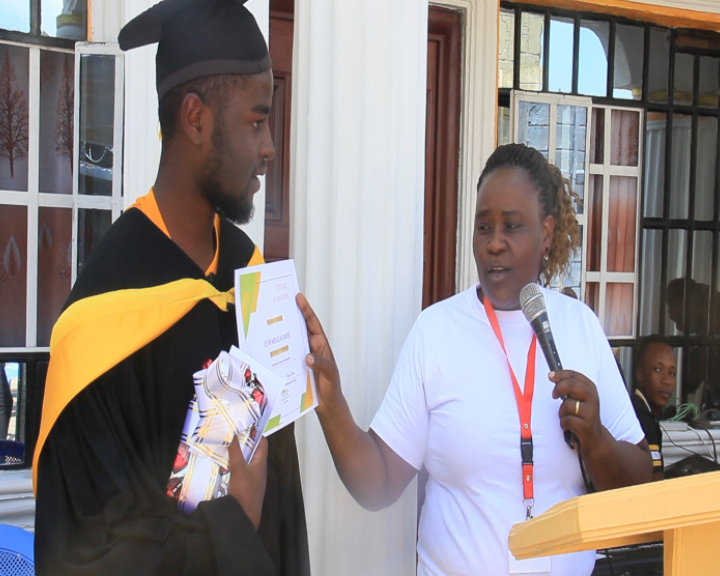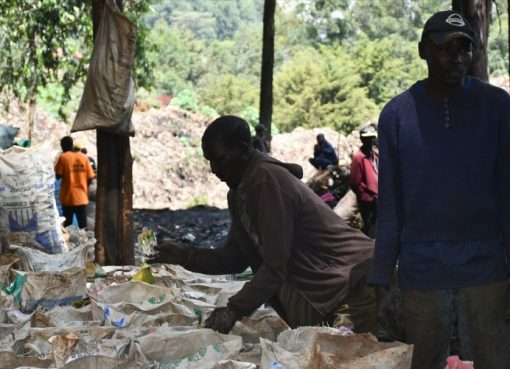Had the then 19-year-old university student known that the first sip of liquor he took as a cheeky activity with friends would spiral out of control and thrust him into a long-drawn-out battle with alcoholism, he might have reconsidered his actions.
Kevin Kamere, a resident of Jawatho village in Nakuru, did not know that bondage, not freedom, awaited him. Hardly a year later, after his first sip in 2020, had he done the unimaginable taking his personal effects and assets and losing them to shylocks to sustain his new addiction.
“I was new on campus when older boys invited me and other first years at a party in one of the hostels. Alcohol was flowing freely and everyone looked happy, so I wanted to experience that. I took a sip from a glass after being edged on by my peers but I did not love the taste,” noted Kamere.
For Kevin, although the first hangover was horrible, being intoxicated made him feel like a “real man” and boosted his self-esteem. A three-year struggle for sobriety had begun for the Information Communication Technology student.
He adds “What had started as a fun time activity became something that went far beyond that. I started to get more involved with alcohol which disrupted my daily routine including attending lectures. I gradually developed a powerful desire for harder drinks that started causing problems in relationships with my lecturers and fellow students at the university.
Kevin describes his battle with alcoholism as grueling. He at one point thought he would die.
When his parents heard about his behaviour, they confronted him, but he denied everything. As he battled alcoholism, his mother prayed for him diligently, even giving him examples of people who had been alcoholics and recovered.
But alcohol was now providing an escape from the pain, stress, and anxiety that he would experience every day.
Kenyans’ drinking problem, he says, starts taking root in universities, where it is fueled by peer pressure, easy accessibility of alcohol, opportunity and the freedom to do whatever one wishes with one’s free time.
“Drinking is a big issue in our universities, which, unfortunately, graduates with many of us to our places of work, marriages, and other relationships we form,” he points out.
As he immersed himself into binging, he reminisces that he lost interest in his former hobbies, got drunk at inappropriate times and needed increased amounts of alcohol to get intoxicated.
Kevin narrates “My academic performance started dipping, I became irritable and depressed, and was more forgetful than I was before drinking became an issue. My unkempt appearance no longer bothered me. I started feeling guilty about my drinking and tried to hide my alcohol consumption from my parents and siblings.”
Things took a worse turn when Kevin who had hitherto been hooked to bottled brands of liquor resorted to illicit alcohol to sustain his addiction.
But his parents, he says, were among few persons who refused to give up on him. “My dad, Pastor Simon Mbugua and my mum Ms. Susan Kamere have been very instrumental- they stood by me through their love and prayers. The turnaround came when I checked into Beyond Love Rehabilitation Center in Njoro Sub-County.”
He continues “the journey between my first sip of alcohol and checking into rehab was long and tortuous. I had to hit rock bottom in order to finally go to rehab. I went in after my parents sat me down for a candid and lengthy talk- I had reached a point where it was do or die.”
Kevin confesses that initially, he was consumed by anger and resentment directed at his parents for checking him into the rehab but as he gradually underwent alcohol detoxification and therapy sessions, he started feeling he had let his parents down- after they made major sacrifices to up bring and educate him.
“It was after a month’s stay at Beyond Love Rehabilitation Center that the significance of what I had been doing dawned on me. I resolved to choose the path of Christianity and regularly attended the sermons organized by clerics here.”
“Although I had nightmares and would shiver, I was determined to keep praying and avoiding alcohol. Having gained experience and recovered from alcoholism, I feel it is time to move back to my society and reach out to the addicts or those struggling to quit alcohol and drugs and turn on a new leaf,” Kamere explained.
He notes other Kenyans are walking down the path he trekked and hardly care the consequences their actions have on their families.
According to Kevin’s father, those who have become alcohol dependent should not be written off from the society when sobriety could be achieved with a helping hand.
Pastor Mbugua holds that therapeutic communities to rehabilitate alcohol dependents should be available in every county. In the unfortunate case where the person relapses, he adds, support and aid should be offered.
“Unfortunately, the media depicts alcohol abuse as a laughing matter, often with footage of people falling over themselves or being extremely incoherent. Alcoholism is sadly not considered a matter of grave concern,” noted the pastor.
The younger generation, he says, further contributes to this carefree public attitude towards alcohol abuse by glorifying being drunk to the point of blackout.
“Sadly, alcoholism does not respect careers, creed, age or any other classification in society. You will find doctors, judges, politicians and even priests who are alcoholics,” observes pastor Mbugua.
Ms. Kamere says while it is important to be open and honest about your concerns over a family member who is an alcoholic, it is important to remember that one cannot force someone to stop abusing alcohol.
She advises “Try to remain neutral and be compassionate with the affected family member rather than judge them or try to shame them. Encourage your loved one to open up about the reasons they are abusing alcohol. Are they bored, lonely, anxious or stressed?”
Kevin’s mother calls on parents whose children are abusing drugs and other substances to avoid emotional appeals that may only add to the troubled alcoholic’s feelings of guilt and increase their compulsion to drink.
“Offer advice not ultimatums. Do not cover up for your loved one or make excuses for their behaviour. Trying to shield them from their responsibilities will only prevent them from seeing the negative consequence of their drinking and could delay them deciding to get help for the problem,” Ms. Kamere adds.
Mr. Markos Mutai, a sociologist and counselor at Beyond Love Rehabilitation Center, says there would be no harm if Kenyans drank to relax. However, the majority do so to escape their problems.
“The poor drink excessively because they are unemployed, unable to educate their children, and unable to fulfill other responsibilities that only money can fulfill,” he notes. The rich, on the other hand, “tend to drink more than they should because they are unhappy, especially if there is no peace at home.”
The second reason he gives is that most Kenyans have no idea what to do with leisure time.
“There are people who have not found a better way to spend their time, the bar therefore becomes the most convenient place to go,” he notes.
Women, according to Mutai, drink to show that they are liberated. “It is their way of saying, here we are, we are women, and we can do what men can do,” he says.
Mutai says one of the best ways to stop a possible addiction before it begins is to be keen on one’s mental state and health.
“You have to be proactive. If you go through a traumatic experience, seek therapy. Don’t look for excuses; they turn into that addiction that you can’t stop. For most people struggling with addiction, it started as a joke. And now they can’t come out of it. You feel so ashamed that you don’t know how to address this issue,” he notes.
Regrettably, the harmful use of alcohol accounts for 3.3 million deaths globally, 320,000 of these being 15 to 29 year-olds.
According to the World Health Organization, alcohol abuse is also the third leading risk factor for poor health globally.
“Alcohol abuse is leading to premature deaths. Urgent action is needed from all of us especially our leaders to tackle this issue of public interest, before any more lives are lost,” notes the counsellor.
By Jane Ngugi and Elizabeth Simiyu




